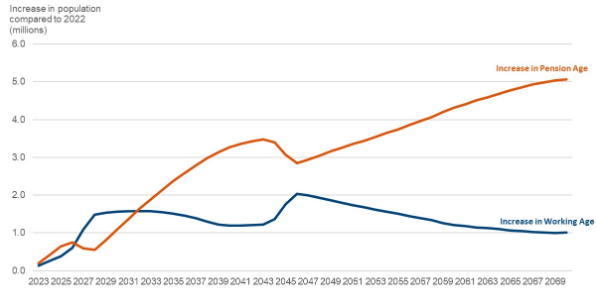UK Government Initiates New State Pension Age Review
The government of the United Kingdom has started a third formal review of the state pension age. In July 2025, Ministers began the process to analyze the long-term affordability, sustainability and fairness of the system. Governments will make a decision concerning whether the regulations of pension entitlement need changed based on the most recent estimates of life expectancy and financial information.
Review Timetable and Key Figures
The state pension age at present is 66 years old, whether one is a man or a woman. The administration intends to raise this to 67 during the period 2026- 2028 in the case of all persons born after April 1960. A further increase to 68 is expected in 2044-2046, but no laws have been passed to implement that plan yet. The legislation recommends a thorough review of the age at which a person gets a state pension every six years in order to make the system affordable and meet the objective changes in population.

Graphical comparison between pension and working age
Cost Pressures and Ageing Population
Government data projects the population aged 85 years and above will expand by 189% during the next 50 years, from 1.8 million in 2025 to 5.1 million by 2075. The annual cost of the state pension already exceeds £150 billion, with forecasts suggesting it may surpass £170 billion before the decade ends. These figures highlight the urgency of managing the scheme’s long-term viability.
Appointment of Independent Reviewer
Dr Suzy Morrissey has accepted an appointment from the Secretary of State for Work and Pensions to deliver an independent report for this review. “The review will consider whether it remains fair and sustainable in light of rising life expectancy and demographic change,” Dr Morrissey explained. She will examine linking the pension age directly to life expectancy, as other countries, such as Denmark and Finland, have implemented similar “automatic adjustment mechanisms.” Dr Morrissey said, “Analysis of automatic adjustment mechanisms used in other countries will form a key part of the review.”
Role of the Triple Lock
The triple lock system governs UK state pension increases. From April 2025, the government delivered a 4.1% annual boost, setting the new full state pension at £230.25 per week and the basic state pension at £176.45 per week. Ministers attribute this rise to average earnings growth. The mechanism ensures the pension rises each year by the highest of inflation, average earnings, or 2.5%. Critics worry that retaining the triple lock could make the system unsustainable by 2034, given current cost projections.
Scope and Purposes of the Review
The government seeks evidence from the public and stakeholders about whether the pension age should link explicitly to life expectancy. Officials will analyse how automatic increases could impact retirement plans and intergenerational fairness. They also hope to determine pension adequacy amid concerns about individuals’ ability to save enough for later life. “Alongside the reactivation of the Pensions Commission, I am also declaring the commencement of the upcoming statutory Government Review of State Pension age,” said Work and Pensions Secretary Liz Kendall.
Also Read: Qantas Ordered to Pay Record $90 Million for Pandemic Layoffs in Historic Workplace Law Ruling
Public Response and Financial Planning
Experts advise individuals to keep abreast of changes. David Pye, a retirement consultant, said, “The launch of the State Pension Age Review is a critical step in laying out the long-term future of this hugely important core benefit for retirees to aid their individual planning and cashflow modelling that many now undertake.” He emphasised the need for reform in private savings to ensure adequate incomes at retirement, given the increasing uncertainty around government support.
International Trends and Future Changes
Dr Morrissey stated that “UK life expectancy at age 66 had continued to rise, although improvements had been much slower than forecast a decade ago.” The review will include international comparisons, especially with Nordic and European systems, to consider how global solutions could serve British needs. Lawmakers and officials expect to announce the outcome by 2029, allowing sufficient consultation and evidence collection.
Continued engagement with workers, retirees, and policy experts will shape the next phase of British pension policy, as the government continues to balance fiscal pressures with societal needs.












